
A lottery is a game in which players pay money for the chance to win a prize based on the drawing of numbers. It is typically run by a government, but may also be operated by private organizations or corporations licensed to operate state lotteries. The first requirement for a lottery is some mechanism to record the identities of bettors and the amounts staked by each. Afterwards, a drawing is held to select winners. There are a number of different ways to run a lottery, but most modern systems have the same basic features.
Many states have used the lottery to finance a variety of public projects, from paving streets to building schools. Generally, a lottery attracts broad public support when it is perceived as benefiting a particular public need. However, studies have shown that the popularity of a lottery is not linked to a state’s actual fiscal condition, and that the success of a lottery is often a matter of luck.
The most successful lottery games tend to be those with the lowest ticket prices, allowing more people to participate. To improve your chances of winning, try playing smaller games that have fewer numbers, like a state pick-3 or EuroMillions. It is important to remember that acquiring real wealth is not easy, and requires years of dedication to proven lottery strategies. Moreover, those who win the jackpot must pay huge taxes, which can quickly erode any remaining wealth.